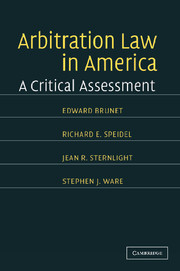Book contents
- Frontmatter
- Contents
- Acknowledgments
- Introduction
- 1 The Core Values of Arbitration
- 2 Common Legal Issues in American Arbitration Law
- 3 The Appropriate Role of State Law in the Federal Arbitration System: Choice and Preemption
- 4 Interstate Arbitration: Chapter 1 of the Federal Arbitration Act
- 5 Consumer Arbitration
- 6 International Commercial Arbitration: Implementing the New York Convention
- 7 Tension Points: Where the Authors Disagree
- Appendices
- A Ware's Revised Chapter 1 of the Federal Arbitration Act: 9 U.S.C. §§1–17
- B Speidel's Revised Chapter 2 of the Federal Arbitration Act
- C Sternlight's Proposed Amendments to the Consumer Arbitration Statute
- D Brunet's Federal Arbitration Act
- Index
C - Sternlight's Proposed Amendments to the Consumer Arbitration Statute
Published online by Cambridge University Press: 16 November 2009
- Frontmatter
- Contents
- Acknowledgments
- Introduction
- 1 The Core Values of Arbitration
- 2 Common Legal Issues in American Arbitration Law
- 3 The Appropriate Role of State Law in the Federal Arbitration System: Choice and Preemption
- 4 Interstate Arbitration: Chapter 1 of the Federal Arbitration Act
- 5 Consumer Arbitration
- 6 International Commercial Arbitration: Implementing the New York Convention
- 7 Tension Points: Where the Authors Disagree
- Appendices
- A Ware's Revised Chapter 1 of the Federal Arbitration Act: 9 U.S.C. §§1–17
- B Speidel's Revised Chapter 2 of the Federal Arbitration Act
- C Sternlight's Proposed Amendments to the Consumer Arbitration Statute
- D Brunet's Federal Arbitration Act
- Index
Summary
AN ACT PROTECTING CONSUMERS' ACCESS TO COURT
SHORT TITLE OF ACT
This Act shall be known as the Act Protecting Consumers' Access to Court of 2006.
DEFINITIONS
For the purposes of this Act,
(a) commerce includes all transactions arising out of interstate or international commerce;
(b) a consumer is any person who uses, purchases, acquires, attempts to purchase or acquire, or is offered or furnished any real or personal property, tangible or intangible goods, services, or credit for personal, family or household purposes, and includes passengers and shippers of goods on common carriers in commerce.
PROHIBITION OF CONSUMER ARBITRATION
Subject to the provisions of Section 4 of this Act, a contract between a consumer and a provider of goods or services is invalid to the extent that it purports to use binding arbitration to deny the consumer access to courts that would otherwise be available to the consumer to enforce legal claims.
EXCEPTION
Notwithstanding the provisions of the foregoing Section 3 of this Act, this law shall not preclude enforcement of an arbitration agreement made knowingly and voluntarily with respect to a dispute existing between the parties at the time the agreement is made, so long as such dispute is specifically described in the arbitration agreement and so long as such arbitration agreement is signed.
- Type
- Chapter
- Information
- Arbitration Law in AmericaA Critical Assessment, pp. 375 - 376Publisher: Cambridge University PressPrint publication year: 2006



